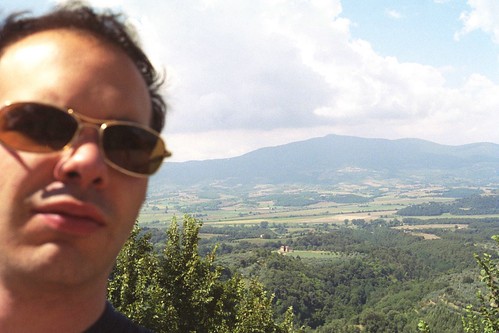
Dreaming has always been an important part of my everyday. When I was a child, I would have recurring nightmares which sent me running into my parent's room looking for some reassurance of reality. It didn't help that many of my dreams included my parents as part of a secret society of adults who sabotaged the lives of children. But one night my dad took the time to wake up and give me what turned out to be life-changing advice. He said, "When you're having a bad dream, pretend that you're watching the TV and only one click of the dial away from the greatest Popeye cartoon you've ever seen." Okay. So I went back to sleep and dreamt his advice, switching channels away from the grandmother wolf tearing the 6-year-old flesh from my legs to Popeye beating the hell out of him as a spinach induced berserker. This was my first introduction to lucid dreaming.
As a teenager I would always read before sleeping, hoping that I could enter the stories in my dreams. At the time I was suspicious of my half-assed religious upbringing, and suddenly concerned about the existence of heaven, which had previously seemed to make any sort of living inconvenience merely an inconvenience. So I found a bible and waded through the thick metaphor until something resonated with me, and I read and read those lines until I memorized them. I figured that if I could immerse myself deeply enough, I would eventually dream of heaven, and therefore experience some of its sensation without having to actually die. Unfortunately I never really succeeded with this experiment, or perhaps some angel erased my memory before I returned to the land of waking, so I eventually gave up.
But I haven't stopped experimenting. In the dreaming state, self-consciousness seems to give way to incredible possibility. One of the most interesting experiments has been trying to acquire new skills in my dreaming. For instance: flying, shape shifting, wrestling velociraptors, seducing supermodels, traveling at the speed of light... and even some less likely skills like improvising three voice fugues, singing a bel canto tenor role, and writing the perfect melody. I have had the great luck of waking in time to realize that my very own brain was capable of improvising the fugue I had just "heard" playing on the radio. But it has been pure discipline which every once in a while musters up the strength to drag my body from a saturated ecstatic sleep over to a piano to plunk out, in the freezing cold, the notes which sounded so silky and fat while floating on the top of the world...
I might as well mention that I was motivated to write after waking from a dream which had me composing a Nocturne on a glass piano floating on the arctic ocean. The world existed in only the brightest reflected white light and dark ocean blue, and I remember breathing in the coldest, most still air which should have frozen my lungs stiff.
Since I've woken, I couldn't stop listening to Nocturne by John Cage. It reminds me of somewhere I've been.


